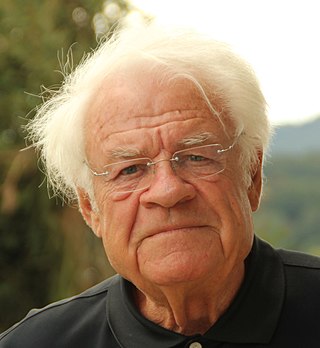Related Research Articles

Hans-Georg Gadamer was a German philosopher of the continental tradition, best known for his 1960 magnum opus, Truth and Method, on hermeneutics.

Hermeneutics is the theory and methodology of interpretation, especially the interpretation of biblical texts, wisdom literature, and philosophical texts. As necessary, hermeneutics may include the art of understanding and communication.

Wilhelm Dilthey was a German historian, psychologist, sociologist, and hermeneutic philosopher, who held G. W. F. Hegel's Chair in Philosophy at the University of Berlin. As a polymathic philosopher, working in a modern research university, Dilthey's research interests revolved around questions of scientific methodology, historical evidence and history's status as a science. He could be considered an empiricist, in contrast to the idealism prevalent in Germany at the time, but his account of what constitutes the empirical and experiential differs from British empiricism and positivism in its central epistemological and ontological assumptions, which are drawn from German literary and philosophical traditions.

Hans Albert was a German philosopher. He was professor of social sciences at the University of Mannheim from 1963, and remained at the university until 1989. His fields of research were social sciences and general studies of methods. He was a critical rationalist, paying special attention to rational heuristics. Albert was a strong critic of the continental hermeneutic tradition coming from Heidegger and Gadamer.
Eranos is an intellectual discussion group dedicated to humanistic and religious studies, as well as to the natural sciences which has met annually in Moscia, the Collegio Papio and on the Monte Verità in Ascona, Switzerland since 1933.
Richard Hönigswald was a well-known philosopher belonging to the wider circle of neo-Kantianism.
David E. Wellbery is an American professor of German Studies at the University of Chicago. As of 2022 he is the chair of the department of Germanic Studies and holds the LeRoy T. and Margaret Deffenbaugh Carlson University Professorship in the department. In 2020 he was elected to the American Philosophical Society.
The double hermeneutic is the theory, expounded by sociologist Anthony Giddens, that everyday "lay" concepts and those from the social sciences have a two-way relationship. A common example is the idea of social class, a social-scientific category that has entered into wide use in society. Since the 1970s, held to be a distinguishing feature of the social sciences, the double hermeneutic has become a criterion for demarcating the human/social from the natural sciences.
Babette Babich is an American philosopher who writes from a continental perspective on aesthetics, philosophy of science, especially Nietzsche's, and technology, especially Heidegger's and Günther Anders, in addition to critical and cultural theory.
Hans Lenk is a German rower who competed for the United Team of Germany in the 1960 Summer Olympics, and an Emeritus Professor of Philosophy. He was born in Berlin.

Hans Lipps was a German phenomenological and existentialist philosopher.
Ingolf Ulrich Dalferth is a philosopher of religion and theologian. His work is regarded as being on the methodological borderlines between analytic philosophy, hermeneutics and phenomenology, and he is a recognized expert in issues of contemporary philosophy, philosophy of religion, and philosophy of orientation.
Christian Lotz is a German-American professor of philosopher at Michigan State University. Lotz's work primarily focuses on 19th and 20th Century European philosophy, continental aesthetics, critical theory, Marxism, and contemporary European political philosophy.

Heiner Bielefeldt is a German philosopher, historian and Catholic theologian. He is Professor of Human Rights and Human Rights Policy at the University of Erlangen. From 2010 to 2016, he served as United Nations Special Rapporteur on Freedom of Religion or Belief.
Odo Marquard was a German philosopher. He was a professor of philosophy at the University of Giessen from 1965 to 1993. In 1984 he received the Sigmund Freud Prize for Scientific Prose.

Peter Trawny is a German philosopher and professor at the University of Wuppertal.
Patrick Aidan Heelan, S.J. was an Irish Jesuit priest, physicist, and philosopher of science. He was William A. Gaston Professor of Philosophy at Georgetown University.

Hans-Herbert Kögler, is a German-American philosopher.
Wolfgang Cramer was a German philosopher and mathematician.

Wolfgang Kuhlmann is a German philosopher and representative of the discourse ethics.
References
- ↑ Andreev, Jassen (2021). "Dimitri Ginev, 1956–2021" (PDF). Verlag Königshausen & Neumann (Ausgabe Herbst/Winter 2021/22) (in German). Archived from the original (PDF) on October 26, 2021. Retrieved January 6, 2022.
- ↑ Angelova, Paula; Andreev, Jassen; Lensky; Emil, eds. (2017). "Preface of the Editors". Das interpretative Universum. Dimitri Ginev zum 60. Geburtstag gewidmet. Würzburg: Köngishausen und Neumann. pp. 9–13. ISBN 978-3-8260-6191-2.
- ↑ Andreev, Jassen. "Bookreview: Entre Anthropologie et Herméneutique". Studia Phaenomenologica. 6 (2006): 453–487 – via Philosophy Dokumentation Center.
- ↑ Lensky, Emil (2020). "Review of D. Ginev (2019) Scientific Conceptualization and Ontological Difference. Berlin/Boston: Walter de Gruyter 2019, pp. 280 + x. ISBN 978-3-11-060373-6". AI & Society. doi:10.1007/s00146-020-01036-5. S2CID 225319604.
- ↑ Glazebrook, Trish (30 August 2018). "Review of D. Ginev Hermeneutic Realism: Reality Within Scientific Inquiry". Notre Dame Philosophical Reviews.
- ↑ Ginev, Dimitri (2019). Toward a Hermeneutic Theory of Social Practices. Between Existential Analytic and Social Theory. London/New York: Routledge.
- ↑ Ginev, Dimitri (1993). "Das utopische Defizit der Moderne. Die Perspektive des hermeneutischen Anarchismus". Neue Realitäten. Herausforderung der Philosophie, Sektionsbeiträge, XVI Deutscher Kongress für Philosophie. Berlin. pp. 305–312. ISBN 3-7983-1553-1.
{{cite book}}: CS1 maint: location missing publisher (link) - ↑ Ginev, Dimitri (2013). Practices and Possibilities. Würzburg: Königshausen & Neumann.
- ↑ Jassen, Andreev. "За Вплетеност и откритост". В-к Култура (v-k Kultura ). 31 (2006).
- ↑ Ginev, Dimitri (2008). Transformationen der Hermeneutik. Würzburg: Königshausen & Neumann. pp. 25–48.